
Putney is a district of southwest London, England, in the London Borough of Wandsworth, five miles southwest of Charing Cross. The area is identified in the London Plan as one of 35 major centres in Greater London.

Fulham is an area of the London Borough of Hammersmith & Fulham in West London, England, 3.6 miles (5.8 km) southwest of Charing Cross. It lies on the north bank of the River Thames, bordering Hammersmith, Kensington and Chelsea. The area faces Wandsworth, Putney, Barn Elms and the London Wetland Centre in Barnes. on the far side of the river.

Hammersmith is a district of West London, England, 4.3 miles (6.9 km) southwest of Charing Cross. It is the administrative centre of the London Borough of Hammersmith and Fulham, and identified in the London Plan as one of 35 major centres in Greater London.
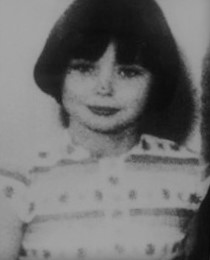
Mary Flora Bell is an English woman who, as a juvenile, murdered two preschool-age boys in Scotswood, an inner suburb of Newcastle upon Tyne in 1968. Bell committed her first murder when she was 10 years old. In both instances, Bell informed her victim he had a sore throat, which she would massage before proceeding to strangle him.

The Hammersmith nude murders is the name of a series of six murders in West London, England, in 1964 and 1965. The victims, all prostitutes, were found undressed in or near the River Thames, leading the press to nickname the killer Jack the Stripper. Two earlier murders, committed in West London in 1959 and 1963, have also been linked by some investigators to the same perpetrator.

Putney Bridge is a Grade II listed bridge over the River Thames in west London, linking Putney on the south side with Fulham to the north. The bridge has medieval parish churches beside its abutments: St Mary's Church, Putney is built on the south and All Saints Church, Fulham on the north bank. This close proximity of two churches by a major river is rare, another example being at Goring-on-Thames and Streatley, villages hemmed in by the Chiltern Hills. Before the first bridge was built in 1729, a ferry had shuttled between the two banks.
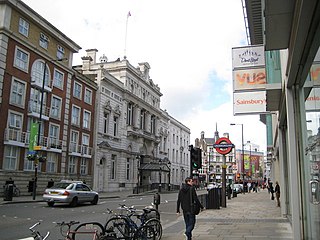
The Metropolitan Borough of Fulham was a Metropolitan borough in the County of London between 1900 and 1965, when it was merged with the Metropolitan Borough of Hammersmith to form the London Borough of Hammersmith and Fulham. It was a riverside borough, and comprised the many centuries-long definition of Fulham so included parts often considered of independent character today Walham Green, Parsons Green, Hurlingham, Sands End and that part of Chelsea Harbour west of Counter's Creek. The SW6 postal district approximately follows this as does the direct, though less empowered, predecessor Fulham civil parish.
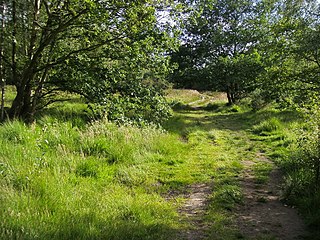
Wimbledon Common is a large open space in Wimbledon, southwest London. There are three named areas: Wimbledon Common, Putney Heath, and Putney Lower Common, which together are managed under the name Wimbledon and Putney Commons totalling 460 hectares. Putney Lower Common is set apart from the rest of the Common by a minimum of 1 mile of the built-up western end of Putney.

Fulham Railway Bridge crosses the River Thames in London. It is very close to Putney Bridge, and carries the London Underground District line between Putney Bridge station on the North, and East Putney station on the South. Fulham Railway Bridge can also be crossed on foot, on the downstream (east) side.

Fulham Road is a street in London, England, which comprises the A304 and part of the A308.
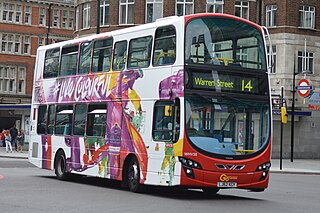
London Buses route 14 is a Transport for London contracted bus route in London, England. Running between Putney Heath and Russell Square, it is operated by London General.

All Saints' Church is the ancient parish church of Fulham, in the County of Middlesex, pre-dating the Reformation. It is now an Anglican church in Fulham, London, sited close to the River Thames, beside the northern approach to Putney Bridge. The church tower and interior nave and chancel are Grade II* listed.

The Half Moon is a public house and music venue in Putney, London. It is one of the city's longest running live music venues, and has hosted live music every night since 1963.
Kenneth Erskine is a British serial killer who became known as The Stockwell Strangler. He committed the murders of 7–11 senior citizens in London between April and July 1986.
The Ranelagh Club was a polo club located at Barn Elms in south west London, England. It was founded in 1878 as a split-off from the Hurlingham Club and by 1894 was the largest polo club in the world. The club had approximately 3000 members in 1913, including many prominent military figures and members of different royal families.
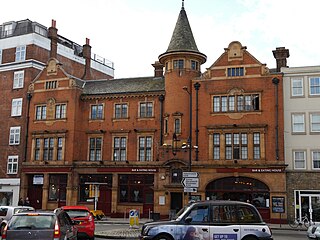
Fulham High Street is a street in Fulham, London.
The 2nd Boat Race took place on the River Thames on 17 June 1836. It was the first of the University Boat Races to be held in London, on a five-and-three-quarter-mile stretch between Westminster and Putney. For the first time, Cambridge sported light blue livery in the form of a ribbon on their boat while Oxford rowed in dark blue jerseys. In a race umpired by Lord Loftus and Mr Hiceson, Cambridge won the race by 20 lengths to level the overall record at 1–1.

The Goat is a public house in Kensington, London, at 3a Kensington High Street, which dates back to 1695. It is where the English serial killer John George Haigh, the "Acid Bath Murderer", met his first victim.

The Green Man is a public house in Putney in the London Borough of Wandsworth, on the edge of Putney Heath, parts of which date back to around 1700. The pub was once frequented by highwaymen and was a popular place for participants to fortify themselves before or after a duel on nearby Putney Heath.
















